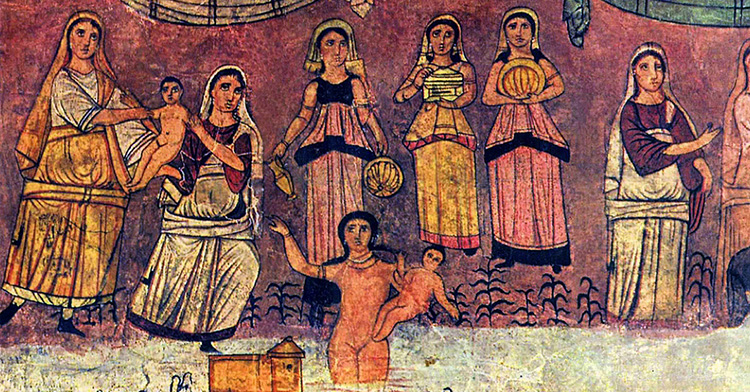I recently attended a chapel service and was moved by the sound of a hymn from my childhood. Hymns are less common in my daily routine now, but that day, I was pleasantly surprised to hear “God of Grace and God of Glory.”
The piano filled the chapel with a quiet power. As the voices began to swell, I felt both memory and hope rising within me. The familiar words carried me back to St. Luke AME Church in Fayetteville, North Carolina, standing next to my grandmother, while also grounding me in the present moment.
The music warmed my heart. It also reminded me that, during times of chaos, I can seek out spaces to reflect on my faith and to reaffirm its importance in guiding my decisions.
Churches are communities that are living expressions of Christian faith, taking diverse forms across cultures and traditions. And one of the most profound ways these communities embody faith is through hymnody. Hymns are more than songs; they are theological anchors that teach us how to pray when our own words fail.
James Abbington, a scholar of African American sacred music at Duke Divinity School, underscores the importance of music in shaping both worship and communal identity. He emphasizes that music in worship is not merely aesthetic but a theological act that forms and sustains the identity of the community.
The hymn I recalled from my childhood, “God of Grace and God of Glory,” was written by Harry Emerson Fosdick. Listening to it recently in the chapel, I realized the hymn offered more than a memorable tune; it was a reminder that the church is still a shelter where God meets us and renews our strength. Fosdick prays:
God of grace and God of glory,
on thy people pour thy power;
crown thine ancient church’s story,
bring her bud to glorious flower.
These words reflect a longing for divine empowerment; not for triumphalism but for transformation, enabling the church to serve as a beacon of hope and unity in a fractured world. Music and worship, as Abbington notes, shape faith communities’ mission and identity, helping them become places where grace is experienced and lives are transformed.
We live in perilous times: war displaces families; famine devastates communities already battered by poverty; cruel policies impact children and families globally. In the midst of this chaos, Christian faith communities must be spaces where individuals can encounter the divine, find healing and be equipped to serve others. As a leader, this call remains constant.
But what do we mean by community? Toby Lowe, of the Centre for Public Impact, defines community as “a group of people who share an identity-forming narrative.” A community is formed around a shared story so central that it shapes how members see themselves and one another.
Lowe writes, “It is this choice to participate in the making and remaking of these stories … that makes me part of the community.” This reminds us that while many communities exist, not every community is for everybody. Faith communities rooted in God’s mercy, however, are intended to be inclusive spaces for all.
Paul insists that an inclusive faith community must always be rooted in God’s mercy: “For God has consigned all to disobedience, that he may have mercy on all” (Romans 11:32 ESV).
In the early church, the tension between Jew and gentile could have splintered the community. Instead, Paul emphasizes that the gospel transcends human boundaries. Mercy, not merit, is the foundation of Christian community, a radical truth pertinent in our divided age. Fosdick echoes this conviction in his hymn:
Save us from weak resignation
to the evils we deplore;
let the search for thy salvation
be our glory evermore.
Faith communities are called to resist the world’s divisions, becoming Spirit-filled realities grounded in God’s mercy. And if mercy is the foundation, humility is the mortar that protects the unity of the body.
Paul exhorts every believer “not to think of himself more highly than he ought to think, but to think with sober judgment, each according to the measure of faith that God has assigned” (Romans 12:3 ESV).
He then describes the church as a body: many members, diverse gifts, one Spirit. Without humility, ambition poisons fellowship; pride fractures the body; competition silences gifts. With humility, however, the church becomes a dwelling of grace, a body knit together, a hymn in harmony, where every stone, every member, every voice matters.
Christian humility is not self-deprecation but sober self-assessment rooted in God’s grace. Leaders must model this posture. In a culture obsessed with platforms and influence, Paul reminds us that God never called us to be famous; God calls us to be faithful. Fosdick’s hymn emphasizes this need for wise, courageous leadership:
Grant us wisdom, grant us courage,
for the facing of this hour.
Yet wisdom without humility turns to arrogance; courage without humility turns to domination. When humility undergirds leadership, gifts are honored, the body flourishes, and Christ is glorified.
If humility is the mortar, then love is the shelter that makes the church a true refuge in life’s storms. Paul exhorts: “Let love be genuine. Abhor what is evil; hold fast to what is good. Love one another with brotherly affection” (Romans 12:9-10a ESV). This is not abstract. It is a vision of the church as a place of safety, where burdens are shared, dignity affirmed and no one discarded. Fosdick further prays:
Set our feet on lofty places;
gird our lives that they may be
armored with all Christlike graces
in the fight to set men free.
The church is not meant to mirror the divisions of the world but to model God’s mercy in action. It is a house of refuge where God’s love is revealed through mutual care, where the hurting are welcomed and hope is preserved until healing comes.
Paul’s vision in Romans 11-12 is concrete guidance for leaders facing division. To build the communities the world desperately needs, leaders must remember: Mercy is our foundation, humility is our mortar, and love is our shelter.
When leaders embrace this call, the church becomes what it was always meant to be: a living body, bound by the Spirit, diverse yet united, humble yet bold, fragile yet enduring. Fosdick’s hymn closes with a plea that could be the church’s prayer today:
Grant us wisdom, grant us courage,
serving thee whom we adore.
And when the world looks upon such a community, it will not see fractured people trying to hold it together. It will see the body of Christ, resurrected, merciful, humble — and alive with God’s glory.

























